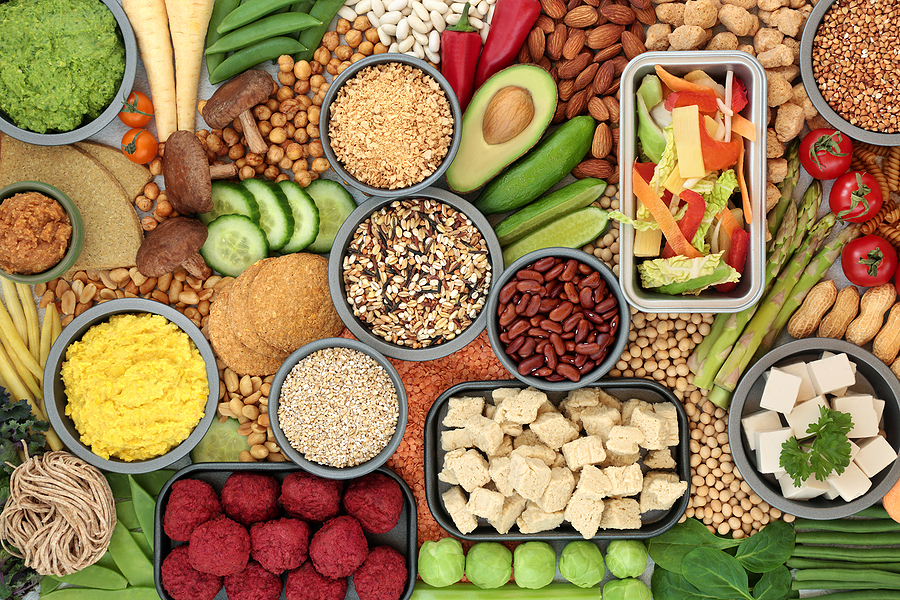Everything About Healthy And Balanced Food: Benefits of Embracing Plant Based Choices
The conversation bordering plant-based diet plans has actually gotten significant attention in recent times. Several individuals are discovering the potential health and wellness advantages, dietary benefits, and environmental impacts connected with these dietary selections. As people come to be extra familiar with their food's impact on health and sustainability, inquiries occur concerning the functionalities of taking on such a way of living. What certain modifications can one anticipate, and exactly how might these options reshape not only personal wellness yet likewise the planet's future?
Understanding Plant-Based Diet Regimens
Numerous people connect plant-based diet regimens primarily with vegetarianism or veganism, these diet plans can incorporate a vast range of consuming patterns that focus on entire, minimally refined plant foods. Such diet regimens frequently consist of fruits, vegetables, entire grains, legumes, seeds, and nuts, while restricting or getting rid of pet products. This adaptability allows people to tailor their nutritional selections according to dietary needs and personal choices. Some might embrace a largely plant-based diet while still sometimes consuming meat or milk, typically described as a flexitarian approach. The focus remains on incorporating more plant foods, which can cause a varied array of tastes and dishes. Understanding these various interpretations of plant-based consuming is essential for appreciating its availability and allure in modern food culture.
Health Perks of Plant-Based Foods
The health and wellness advantages of plant-based foods are significant, providing a nutrient density advantage that sustains general health. Study shows that these foods can boost heart health and play a vital function in efficient weight monitoring. By including extra plant-based alternatives, people might boost their nutritional options and advertise long-term wellness.
Nutrient Thickness Benefit
Nutrient thickness plays a crucial duty in the wellness advantages of plant-based foods, making them an engaging option for those seeking a balanced diet. Plant-based foods, such as fruits, vegetables, beans, nuts, and entire grains, are usually abundant in necessary vitamins, minerals, and anti-oxidants while being lower in calories. This high nutrient density allows people to eat less calories while still fulfilling their dietary requirements. Furthermore, these foods are packed with nutritional fiber, advertising digestive wellness and helping in weight administration. By incorporating nutrient-dense plant-based alternatives, customers can improve their overall wellness, support their immune systems, and lower the danger of chronic conditions. Inevitably, the nutrient density of plant-based foods emphasizes their value in a health-conscious way of life.
Heart Health Renovation

Weight Management Assistance
Along with advertising heart health and wellness, a plant-based diet can substantially help in weight management. This nutritional method stresses whole foods such as fruits, veggies, vegetables, nuts, and whole grains, which are normally lower in calories and greater in fiber compared to animal-based items. The high fiber content aids enhance satiation, decreasing total calorie intake. Plant-based diet plans are often rich in crucial nutrients while low in undesirable fats, making it easier to preserve a healthy and balanced weight. Study suggests that individuals that embrace a plant-based way of living tend to have reduced body mass indexes (BMIs) and experience even more effective weight management contrasted to those who take in meat-heavy diet regimens. Welcoming plant-based alternatives is a strategic option for reliable weight management.
Nutritional Value of Plant-Based Components
Plant-based components are abundant in crucial nutrients, offering a diverse range of vitamins, minerals, and antioxidants that contribute to general health and wellness. A contrast of protein resources reveals that while animal products are frequently deemed remarkable, lots of plant-based alternatives give ample healthy protein and various other valuable substances. Recognizing the dietary worth of these components can assist individuals make notified dietary choices.
Essential Nutrients in Plants
Nutrient-rich ingredients found in plants offer a varied selection of necessary nutrients that add significantly to overall health. These ingredients are abundant in vitamins A, C, and K, which support immune function, vision, and blood clot, specifically. In addition, plants offer important minerals such as calcium, magnesium, and potassium, critical for heart wellness, muscle mass function, and bone toughness. The presence of fiber in plant-based foods help digestion and promotes a healthy and balanced digestive tract microbiome. Antioxidants, located generously in veggies and fruits, help fight oxidative anxiety and decrease swelling. Several plant foods are low in calories yet high in nutrients, making them a superb choice for those looking for to maintain a healthy and balanced weight while making certain suitable nutrient intake.

Comparing Healthy Protein Resources
Healthy protein resources vary significantly in their nutritional profiles, with plant-based active ingredients supplying one-of-a-kind benefits. Unlike animal proteins, which frequently contain hydrogenated fats and cholesterol, plant healthy proteins have a tendency to be lower in these unhealthy components. Legumes, nuts, seeds, and entire grains are rich in vital amino acids, fiber, vitamins, and minerals. Lentils supply high protein web content together with significant iron and folate, while quinoa is a full healthy protein, providing all nine essential amino acids. In addition, plant-based proteins are commonly accompanied by anti-oxidants and phytochemicals that sustain general wellness. The change to plant-based healthy protein sources not just boosts dietary intake but also lines up with lasting nutritional methods, minimizing environmental effect and promoting lasting health advantages.
Environmental Influence of Plant-Based Consuming
As awareness of environment change grows, many people are exploring lasting nutritional options that can substantially decrease their environmental footprint. Plant-based consuming has become a significant factor to lowering greenhouse gas emissions, which are mostly associated with animals production. The growing of fruits, legumes, veggies, and grains commonly needs fewer resources, such as water and land, compared to pet farming. In addition, plant-based diets can bring about lowered deforestation, as less land is needed for grazing livestock or Check Out Your URL growing pet feed. By shifting towards plant-based choices, consumers can support biodiversity and advertise much healthier ecosystems. In general, accepting plant-based consuming not just benefits personal health however likewise stands for an essential action towards ecological sustainability and preservation initiatives.
Conquering Common Misconceptions
While several people recognize the benefits of a plant-based diet, several misunderstandings commonly deter them from fully embracing this way of living. An usual idea is that plant-based diets lack enough healthy protein; nonetheless, various plant resources, such as vegetables, nuts, and tofu, supply sufficient protein. In Click Here addition, some assume that this diet regimen is pricey, when in reality, staples like beans, rice, and seasonal vegetables can be quite inexpensive. Another misconception is that plant-based consuming is extremely restrictive, whereas it in fact provides a varied variety of foods and flavors. Ultimately, lots of worry that a plant-based diet might lead to deficiencies, yet with correct planning, individuals can get all necessary nutrients, including minerals and vitamins, while appreciating a variety of tasty meals.
Tips for Transitioning to a Plant-Based Lifestyle
Making the shift to a plant-based way of living can be an enhancing experience, though it usually calls for some support to browse the preliminary modifications. First, people are encouraged to start progressively, including even more fruits, veggies, legumes, and entire grains right into their meals while reducing meat and milk intake. Meal preparation is important; preparing a regular menu can aid reduce the adjustment and protect against final unhealthy choices. Exploring cooking approaches and brand-new recipes can also boost the experience and maintain enjoyment about plant-based eating. Furthermore, joining support groups or communities can supply inspiration and share beneficial ideas. Ultimately, staying informed regarding nutrition warranties balanced meals, protecting against deficiencies while cultivating a healthy and balanced, satisfying plant-based way of living.
Delicious Plant-Based Dish Ideas
Exploring tasty plant-based meal ideas can inspire individuals to accept a more nutritious diet regimen. One popular alternative is a passionate quinoa salad, including cherry tomatoes, cucumber, and a spicy lemon-tahini clothing. An additional fave is a mouthwatering lentil stew, loaded with carrots, celery, and aromatic herbs, excellent for a reassuring supper. For morning meal, over night oats made with almond milk, chia seeds, and covered with fresh berries supply a healthy beginning to the day. In addition, a vivid veggie stir-fry with tofu and a range of vibrant veggies can be a quick yet satisfying meal. Ultimately, creamy avocado toast on whole-grain bread, sprayed with seeds and seasonings, provides a basic yet flavorful snack. These meals display the range and splendor of plant-based eating.

Regularly Asked Questions
Can a Plant-Based Diet Plan Supply Sufficient Healthy Protein?
The inquiry of whether a plant-based diet regimen can supply adequate protein prevails. Numerous resources, including beans, nuts, seeds, and entire grains, can meet healthy protein requires efficiently, sustaining a balanced and nutritious diet for individuals.
Are Plant-Based Diet Plans Suitable for Children?
The viability of plant-based diet plans for children depends upon careful planning. Adequate nutrients need to be assured, including vitamins, healthy proteins, and minerals. With correct advice, such diets can support healthy growth and advancement in children.
Exactly how Do I Eat in restaurants on a Plant-Based Diet plan?
Dining out on a plant-based diet regimen involves seeking dining establishments with diverse menus, asking for modifications, and exploring vegan-friendly options. Preparation in advance and connecting dietary preferences can enhance the eating experience while preserving nutritional options.
What Prevail Irritants in Plant-Based Foods?
Usual allergens in plant-based foods include soy, gluten, nuts, and seeds - Plant Based Chicken. Individuals adhering to a plant-based diet regimen needs to understand these allergens and read tags meticulously to prevent negative responses and ensure safe usage
Can Plant-Based Diets Assist With Fat Burning?
Study shows that taking on a plant-based diet regimen might promote weight reduction because of its typically lower calorie thickness and higher fiber web content. This combination can enhance satiety, helping individuals handle their calorie intake effectively. Lots of individuals associate plant-based diet regimens mainly with vegetarianism or veganism, these diet regimens can encompass a vast range of consuming patterns that prioritize whole, minimally processed plant foods. Nutrient density plays an essential duty in the health and wellness advantages of plant-based foods, making them a compelling choice for those seeking a balanced diet regimen. Plant-based diet plans have been shown to noticeably boost heart health, as they typically include aspects that support cardiovascular function. In enhancement to advertising heart wellness, a plant-based diet plan can substantially assist in weight monitoring. A typical belief is that plant-based diets do not go have sufficient healthy protein; nonetheless, various plant resources, such as vegetables, nuts, and tofu, offer ample healthy protein.